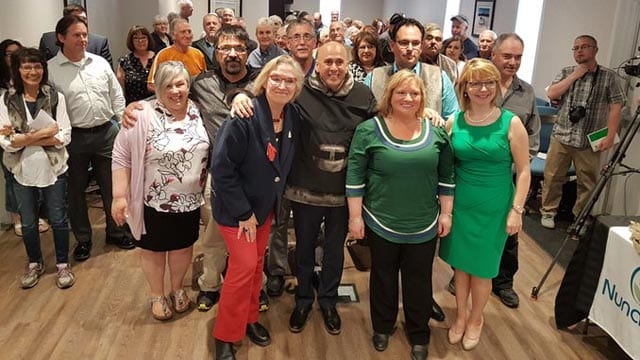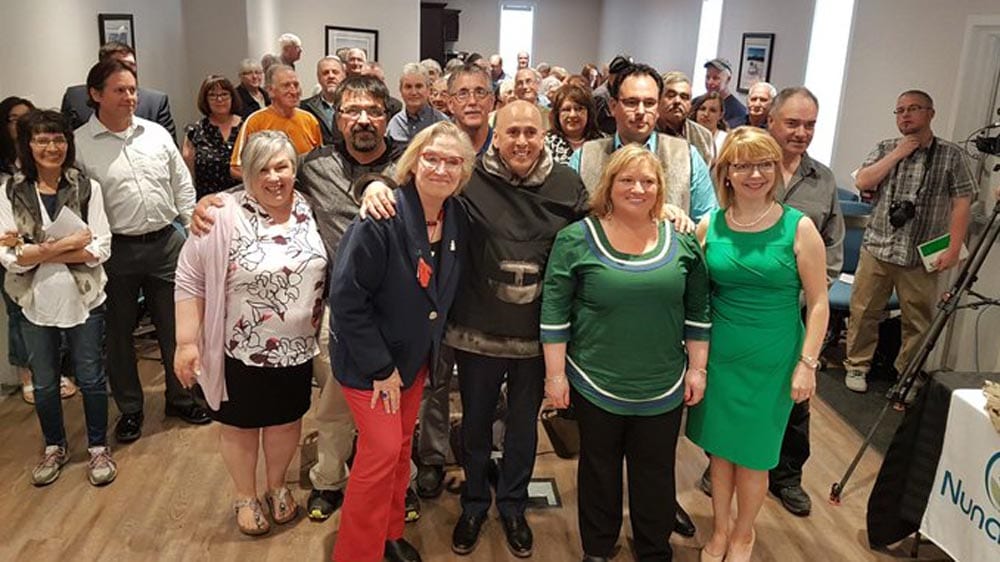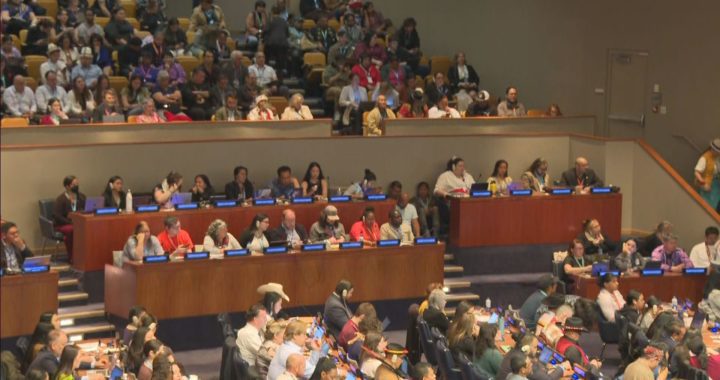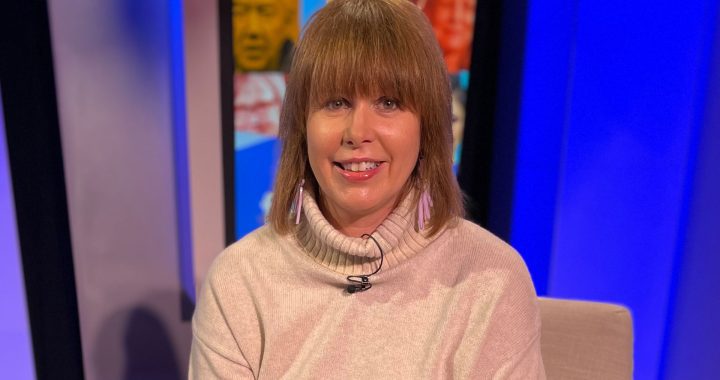
(Supporters surround Crown-Indigenous Relations Minister Carolyn Bennett (red pants) NCC President Todd Russell, and Labrador MP Yvonne Jones at the negotiation announcement Thursday in Labrador)
Canada announced plans on Thursday to begin negotiations with the NunatuKavut Community Council (NCC) in Labrador, a political organization representing around 6,000 members of self-identified Inuit residing primarily in Central and Southern Labrador.
Crown-Indigenous Relations Minister Carolyn Bennett joined former Liberal caucus colleague and NCC President Todd Russell for the announcement in Happy Valley-Goose Bay.
Calling the launch of “exploratory negotiations” a “shared journey of reconciliation,” Bennett said Canada and the NCC will “identify the scope, nature, and extent of Indigenous rights and how they should and could be implemented.
“Our goal is to develop and seek a joint mandate for negotiations,” she explained.
Russell called the announcement “truly historic,” as the group, which previously identified as Metis, has been fighting for Indigenous rights and recognition since the early 1980s.
“This is what today is about: that recognition that we are one of the Original People,” Russell said to a room full of NunatuKavut members, supporters, and media.
“We come from a people that has a long history even before our own memory. That’s what we’re about here today, that we are a First Peoples of this land, and we have rights in this land.”
Innu leaders responded to the announcement Thursday afternoon, criticizing Canada’s decision to begin new negotiations with the NCC before finalizing the Innu Nation’s land claim, for which an Agreement in Principle was signed in 2011.
They say NunatuKavut is claiming land already claimed by Innu, whose presence in their ancestral territory of Nitassinan predates Inuit and European occupancy by thousands of years.
Some of that land includes parts of the Churchill River, including the site of the Muskrat Falls hydroelectric project, which Canada, Newfoundland and Labrador and the Innu Nation signed a binding agreement over in 2011.
“We are very disappointed and frustrated that Carolyn Bennett had this meeting without our input….because our land claim is before them and [talks] have been ongoing for over 40 years now,” said Innu Nation Grand Chief Greg Rich.
Rich said the Innu only found out Wednesday about Bennett’s visit to Labrador, and that the minister has not agreed to meet with them while she’s in town.
“Why didn’t Carolyn Bennett approach us when she was going to have this meeting with NunatuKavut?” he said. “The federal government needs to address our claim before Canada can recognize other claims before them.”
Rich also said the federal government made the Innu go through a decades-long process, including the completion of a comprehensive land and occupancy study, before beginning negotiations, and that facilitating a different process for the NCC is “unfair to the Innu Nation and to our members.”
Former Innu Nation Grand Chief and current Innu land claims negotiator Peter Penashue, who also served as MP for Labrador in the Harper government, was blunt in his criticism of NunatuKavut as a political organization and Aboriginal people.
Penashue said that with the Innu in the “final stages” of their land claims process, “suddenly we find ourselves having to fight over land with this new group.”
He questioned the group’s claim of Indigeneity and assertion of Aboriginal rights, saying when the Innu and Inuit of northern Labrador began fighting for recognition and rights in the 1970s they did not know of a third Indigenous group occupying the same lands as them.
The Labrador Metis Association formed in the early 1980s to begin fighting for recognition of those of mixed settler-Inuit ancestry in Labrador who did not identify as members of the Inuit communities of the north. The organization renamed itself NunatuKavut Community Council in 2010.
NunatuKavut means “Our Ancient Land”.
About 10 years ago leadership began identifying its membership as “Inuit-Metis”. And recently Russell and some of the group’s membership began identifying as Inuit, or “Southern Inuit”.
The group’s website states “the southern Inuit of Labrador share commonalities with the northern Inuit of Labrador, but our communities have distinct histories, customs and traditions,” and that membership “is open to people of Native ancestry, originally from Labrador.”
Penashue said prior to the emergence of Metis—or Southern Inuit—Innu and Inuit have “always known each other, but now here we are in a very unusual circumstance — settlers becoming Metis, becoming Inuit, and are now going to fight us over land.
“Canada has just created a huge mess in Labrador,” he said.
Bennett was not available for questions following the press conference, and Russell did not respond to an interview request.
Bennett indicated during the announcement that for the NCC negotiations Canada “will be sitting down with a blank sheet of paper,” and that the process of recognizing and implementing Indigenous rights for NunatuKavut will not follow the comprehensive land claims process as Canada is currently doing with about 60 other groups across the country.
“The old process for self-determination often led to frustration because we would again, as Canada, just give your final offer and say this is the best we can do, see you in court. Those days are over. That didn’t work. All that time and money in court is not a proper way forward,” she said.
The announcement also comes ahead of the Trudeau government’s anticipated Recognition and Implementation of Rights framework, which has not been fully articulated but has already come under fire from critics like Hayden King at Ryerson University’s Yellowhead Institute, who warns in a recent report of “the danger of accepting government messaging” on the framework “as currently articulated.”
King and report co-author Shiri Pasternak say early pieces of the framework hint at a “very narrow vision of Indigenous jurisdiction over lands, resources and self-determination generally.”
Leaders were scant on details Thursday around Canada and NunatuKavut’s negotiations, only to say that a council would soon be formed to represent and seek input from NunatuKavut communities.
Russell said the announcement “means that we will be engaged in talks about our people and once again have decision-making power over our lands and resources.
“It means a greater ability to deliver programs and services like healthcare and education that are aligned with our values and way of life. It means that the government’s projects can only happen on our lands with our consent and participation.
“Now that NunatuKavut is recognized as an Indigenous rights holder, discussions will proceed to recognize those rights.”
No one from Nunatsiavut Government, which represents the Inuit of northern Labrador, or Inuit Tapiriit Kanatami, which advocates for the interests and rights of all Inuit in Canada, was available for comment Thursday.










